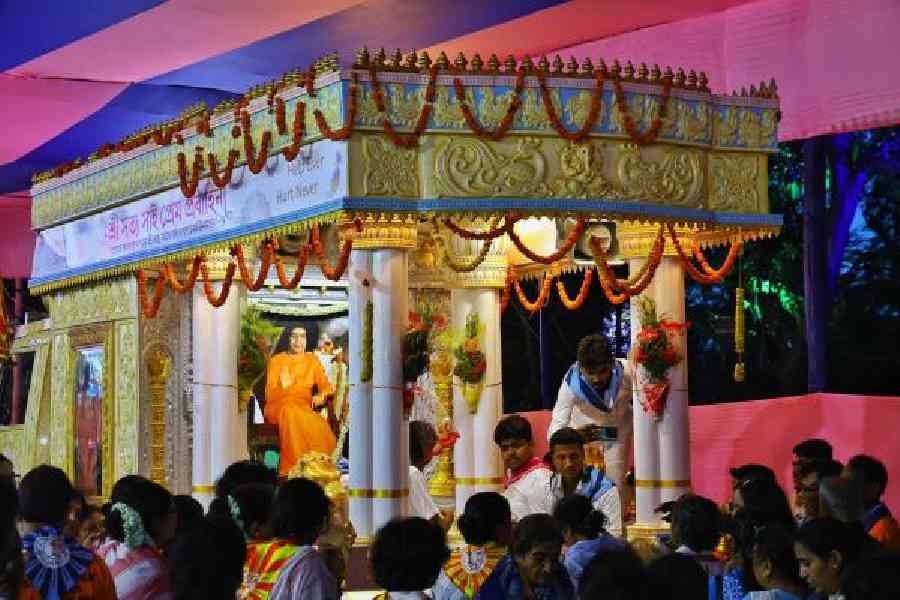A grand chariot rolled into Aikatan carrying the message of Sathya Sai Baba. It had been travelling for months from Puttaparthi, the headquarters of Sri Sathya Sai district in Andhra Pradesh.
The chariot was part of the centenary celebrations of the holy man, and was hosted locally by the West Bengal chapter of the Sathya Sai Organisation.
“For the birth centenary, five chariots, crafted by master artisans of Odisha, began their journey from Puttaparthi in April this year. For the next 18 months, they will cover 30,000km across the country, spreading the message of love, peace, and selfless service,” said Pritam Kumar Nag, president of the West Bengal chapter, addressing the gathering. “Baba’s core message is that service to humanity is service to God. Anyone, regardless of caste or creed, can be his follower.”
The chariots will return to Puttaparthi in November 2026, in time for Baba’s 100th birth anniversary. The West Bengal chapter is leading efforts in north India, with one chariot touring North 24-Parganas, offering devotees a chance for darshan and blessings.
The day-long programme at Aikatan featured devotional chanting, a health awareness camp, service to the needy, youth empowerment programme, cultural performances, and finally, the reception of the chariot. Conchshells blew, women performed mangalaarti and a procession followed.
“I’m unwell, yet I could walk to the Bypass to welcome Baba’s chariot. This was possible only through his blessings,” said Manika Mukherjee, an FD Block resident and organiser, who marked the chariot’s arrival by cracking a coconut. “I had met Baba 50 years ago.”
Sahasradip Dutta, a devotee who accompanied the chariot, shared: “The chariot began its journey from Kalyani at 8.30am, halting at Kanchrapara, before proceeding to EZCC.” After rituals and bhajans, it rolled towards the Barrackpore centre.
“Devotees from 140 countries are marking Baba’s birth centenary. New York City mayor Eric Adams proclaimed April, 24, 2025 (Baba had died on April 24, 2011) as Sri Sathya Sai Baba Centennial Celebration Day. The Indian government is issuing a commemorative coin worth Rs 100 to mark the occasion,” said Kalyan Roy, an organiser and resident of BG Block.
Convener Goutam Ghosh spoke of Baba’s humanitarian initiatives, include free hospitals, free education, water projects, solar power initiatives etc. “Even we, today, as part of our youth empowerment programme, we distributed five sewing machines to needy women who excelled in vocational training,” he said.
PLAYTIME: HERE AND THERE
Salt Lake Dekhashona staged two audio plays and a drama at Rabindra Okakura Bhavan that drew a full house.
The first was Brown Saheber Bari, based on a short story by Satyajit Ray, performed as a solo voice drama by Abhishek Barua. The story followed an Englishman living in colonial India who is haunted by the presence of his beloved cat even after the pet’s death.
“I wanted the silences in this act to speak louder than the words,” said Barua afterward. “There’s a loneliness in this character that many people, especially today, can relate to.”
The audience responded with appreciation. "The act was eerie yet empathetic. It felt like being trapped in someone else’s mind,” said Anish Basu, who was in the audience.
The second performance, Aparajita, written by Ranjana Bhanja, brought an entirely different energy to the stage. Performed by Swapan Basu and Ishani Biswas, this audio drama narrated the story of a woman who sets out to avenge the suffering and humiliation of her sister.
Where Basu lent a grounded weight to the narrative, Biswas’ voice burned with the unyielding resolve of the protagonist. The piece explored gender, patriarchy, judgment of society, and the complexities of family relationships through its minimalist but poignant form. “This story is so close to the truth for many women,” said Biswas. “I could feel every beat of her pain, rage, her decision to not back down.”
Basu played the antagonist. “My job was to give her silence the weight it deserved. Sometimes, supporting a character means knowing when to hold back and let them shine,” he said.
The final act was the stage play Gyarabazaar PS, written by Nirup Mitra and performed by a nine-member ensemble cast. Set within the confines of a bustling police station, the play served as a hilarious commentary on bureaucracy, relationships and the everyday absurdities of life.
The ensemble brought together colourful characters, from petty criminals and eccentric complainants to comically unorthodox police inspectors. Confusion, miscommunication and bizarre coincidences led to hilarious outcomes.
A highpoint was when Sutapa Das's character approached an emotionally awkward inspector to report her husband’s threats after refusing divorce, but the cop (played by Hirak Subhra Chatterjee) ended up proposing marriage to her instead!
The cast also included Mita Majumder, Dhritisha Basu, Debashish Brahma, and Pradip Das, among others. “We’re more like a family than a cast,” said Chatterjee, who also directed the play. “We rehearsed for some four months and built trust and freedom, which is what you need when you’re playing off each other on stage."
“We started Dekhashona with a desire to create space for meaningful theatre,” said Susanta Gupta, one of the founding members. “Watching a packed auditorium today we felt our dream has grown much bigger than we imagined.”
Srijita Talukdar










